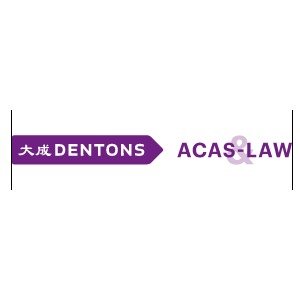Best Biotechnology Lawyers in Port Harcourt
Share your needs with us, get contacted by law firms.
Free. Takes 2 min.
List of the best lawyers in Port Harcourt, Nigeria
About Biotechnology Law in Port Harcourt, Nigeria:
Biotechnology is a rapidly developing field in Port Harcourt, Nigeria. It involves the use of living organisms, biological systems, or their derivatives to create or modify products, processes, or systems for beneficial purposes. Biotechnology law in Port Harcourt governs the ethical, legal, and social implications of this emerging industry.
Why You May Need a Lawyer:
There are several situations where you may require legal help in the field of biotechnology in Port Harcourt:
- Intellectual property protection for biotechnological inventions
- Reviewing and negotiating contracts related to biotechnology research, development, or commercialization
- Compliance with local regulations and laws concerning biotechnology
- Handling disputes or litigation arising from biotechnology-related activities
- Seeking legal advice on ethical considerations in biotechnology
Local Laws Overview:
In Port Harcourt, Nigeria, several laws and regulations are particularly relevant to biotechnology:
- The National Biotechnology Management Agency Act regulates the research, development, and application of biotechnology in Nigeria.
- The National Office for Technology Acquisition and Promotion Act focuses on intellectual property rights, patent registration, and technology transfer.
- The National Biosafety Management Agency Act establishes guidelines for the release, transfer, and handling of genetically modified organisms (GMOs).
Frequently Asked Questions:
Q: Are there any specific regulations for genetically modified organisms (GMOs) in Port Harcourt, Nigeria?
A: Yes, the National Biosafety Management Agency Act provides regulations for the research, development, use, and release of GMOs. It lays down guidelines to ensure the safe handling and use of GMOs in the country.
Q: What are the penalties for non-compliance with biotechnology laws?
A: Non-compliance with biotechnology laws in Port Harcourt can result in significant penalties, including fines, imprisonment, and revocation of licenses or permits. It is crucial to adhere to all relevant regulations to avoid legal consequences.
Q: How can I protect my intellectual property rights in the field of biotechnology?
A: To protect your intellectual property rights, you can file for patents, trademarks, or copyrights for your biotechnological inventions or creations. Consulting with a qualified intellectual property lawyer is advisable to navigate the complex process effectively.
Q: Which government agency oversees biotechnology activities in Port Harcourt?
A: The National Biotechnology Management Agency (NBMA) is responsible for overseeing biotechnology activities in Port Harcourt and ensuring compliance with established regulations.
Q: Are there any ethical considerations in biotechnology?
A: Yes, biotechnology often raises ethical concerns, particularly in areas such as genetic engineering and human cloning. It is essential to seek legal advice to ensure your biotechnology practices align with ethical guidelines and principles.
Additional Resources:
For further information and legal support in the field of biotechnology, the following resources may be helpful:
- National Biotechnology Management Agency (NBMA) - www.nbma.gov.ng
- National Office for Technology Acquisition and Promotion (NOTAP) - www.notap.gov.ng
- National Biosafety Management Agency (NBMA) - www.nbma.gov.ng
Next Steps:
If you require legal assistance in the field of biotechnology in Port Harcourt, it is recommended to:
- Identify the specific issue you need legal help with
- Research and select a reputable biotechnology lawyer
- Contact the lawyer and schedule a consultation
- Prepare relevant documents and information for the consultation
- Discuss your concerns and seek legal advice from the lawyer
- Follow the lawyer's guidance and decide on the best course of action
Lawzana helps you find the best lawyers and law firms in Port Harcourt through a curated and pre-screened list of qualified legal professionals. Our platform offers rankings and detailed profiles of attorneys and law firms, allowing you to compare based on practice areas, including Biotechnology, experience, and client feedback.
Each profile includes a description of the firm's areas of practice, client reviews, team members and partners, year of establishment, spoken languages, office locations, contact information, social media presence, and any published articles or resources. Most firms on our platform speak English and are experienced in both local and international legal matters.
Get a quote from top-rated law firms in Port Harcourt, Nigeria — quickly, securely, and without unnecessary hassle.
Disclaimer:
The information provided on this page is for general informational purposes only and does not constitute legal advice. While we strive to ensure the accuracy and relevance of the content, legal information may change over time, and interpretations of the law can vary. You should always consult with a qualified legal professional for advice specific to your situation.
We disclaim all liability for actions taken or not taken based on the content of this page. If you believe any information is incorrect or outdated, please contact us, and we will review and update it where appropriate.
















